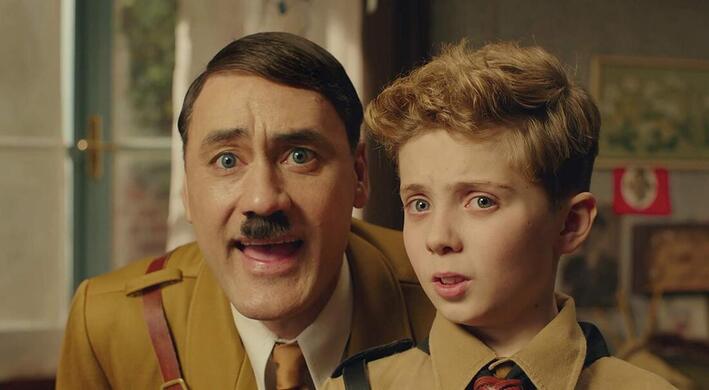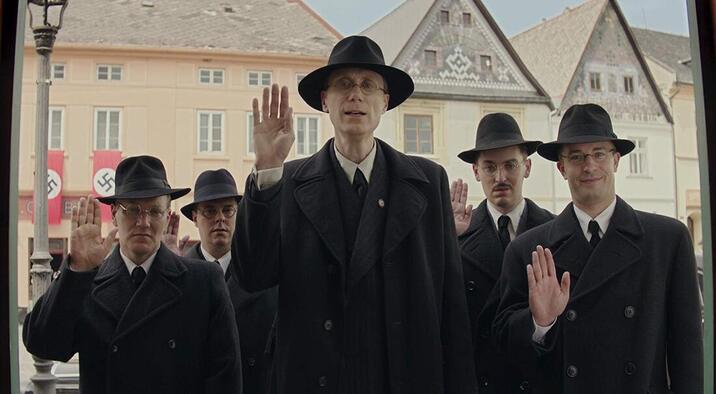JOJO RABBIT
****
Director: Taika Waititi
Screenwriter: Taika Waititi, based on the novel Caging Skies by Christine Leunens.
Principal cast:
Taika Waititi
Roman Griffin Davis
Scarlett Johansson
Thomasin McKenzie
Sam Rockwell
Rebel Wilson
Country: New Zealand/USA/Czech Republic
Classification: M
Runtime: 108 mins.
Australian release date: 26 December 2019
Previewed at: In season at the Verona Cinema, Paddington, Sydney.
Satire is defined as the use of irony to ridicule people’s stupidity or vices, often within the realm of politics. In the wonderfully bizarre Jojo Rabbit, directed by and starring Taika Waititi as one of the main characters (Adolf Hitler, no less), the audience is taken on a journey that is sometimes hilarious and often very dark. It bravely sets out to satirise political fanaticism and the cult of personality that surrounded Hitler; Waititi even compares the adoration of der Führer to Beatlemania. It’s a clever trick and it works, for the most part, but it won’t be to everyone’s taste. Indeed, some criticism has already been directed its way and there is no doubt that it pushes the boundaries but Waititi recently explained to Steve Rose of The Guardian that, “… going into this, I always knew it would be a little bit divisive. But I didn’t want to make a film that every single person loved and thought was a charming, whimsical tale about a boy that finds a girl in his attic. That, to me, is incredibly boring and absolutely pointless.”
Jojo (Roman Griffin Davis) is only 10 years old but he’s a willing member of the Hitler Youth, despite being bullied by other members of the group because he is timid and a bit cack-handed. He’s so brainwashed that he has created an imaginary version of Hitler in his mind, who he calls ‘Adolf.’ While out on a group excursion in the woods, however, he refuses to strangle a rabbit so is deemed weak, lacking in the required German fighting spirit, and promptly given the cruel nickname Jojo Rabbit. His dad has disappeared, off fighting the war he thinks, and his mother Rosie (Scarlett Johansson) is a doting, kind woman who is hiding a Jewish orphan, Elsa (NZ actress Thomasin McKenzie), in their attic. When Jojo discovers Elsa, he threatens to reveal her presence to the Nazis until she explains to him that by doing so he will put his mother’s and his own life at risk. She caustically, and correctly, tells him that he is just “a 10-year-old boy in a funny uniform who wants to be part of a club.” Jojo’s only real buddy is an overfed youngster called Yorkie (Archie Yates) who, when the going gets tough, wants to go home to his mother, saying “I need a cuddle.”
The performances are solid and the actors succeed in delivering the outrageous dialogue with aplomb. Waititi is resplendent as the bumbling leader of the Nazis, dressed in baggy jodhpurs - he even asks Jojo if his pants would look better if wider - and his dialogue is completely crazy at times, modern in style and sensibility. He complains to Jojo that some people say a lot of nasty things about him, such things as, “Oh the guy’s a lunatic! Oh, look at that psycho! He’s gonna get us all killed!” Johansson underplays Rosie but perhaps it goes with the territory - the young mother is patiently waiting for her good kid to emerge from under his coating of “blind fanaticism,” while having to keep secrets from him. Thomasin McKenzie, who we last saw in Leave No Trace, is very good as the girl/woman who, while conflicted, sees the decent heart beating inside Jojo’s young breast. More comedic roles are supplied by Rebel Wilson as Fraulein Rahm, who mentors the youth group in Nazi ‘values’; Sam Rockwell as Captain Klenzendorf, a wounded soldier attempting to train the hapless boys in the art of battle; and Stephen Merchant plays Deertz, an SS Commandant whose job it is to weed out anti-Nazi activists. However, the most endearing roles are portrayed by young Griffin Davis and Yates as Jojo and Yorki, whose friendship and juvenile naivety keep the seriousness of the real situation under control.
Exuding glorious, bright production design and impeccable costumes adds to the weirdness of the situation and complements the dark humour that is Waititi’s typical trait but, be warned, there are a few genuinely shocking scenes that are a long way from being funny and are certainly not meant to be. One suspects that it is these shifts in tone that have upset some critics. The film is not a rollicking comedy from start to finish; it has some serious points to make. Although strange in content, Jojo Rabbit is an intriguing addition to the summer holiday release season that should not be missed.
Screenwriter: Taika Waititi, based on the novel Caging Skies by Christine Leunens.
Principal cast:
Taika Waititi
Roman Griffin Davis
Scarlett Johansson
Thomasin McKenzie
Sam Rockwell
Rebel Wilson
Country: New Zealand/USA/Czech Republic
Classification: M
Runtime: 108 mins.
Australian release date: 26 December 2019
Previewed at: In season at the Verona Cinema, Paddington, Sydney.
Satire is defined as the use of irony to ridicule people’s stupidity or vices, often within the realm of politics. In the wonderfully bizarre Jojo Rabbit, directed by and starring Taika Waititi as one of the main characters (Adolf Hitler, no less), the audience is taken on a journey that is sometimes hilarious and often very dark. It bravely sets out to satirise political fanaticism and the cult of personality that surrounded Hitler; Waititi even compares the adoration of der Führer to Beatlemania. It’s a clever trick and it works, for the most part, but it won’t be to everyone’s taste. Indeed, some criticism has already been directed its way and there is no doubt that it pushes the boundaries but Waititi recently explained to Steve Rose of The Guardian that, “… going into this, I always knew it would be a little bit divisive. But I didn’t want to make a film that every single person loved and thought was a charming, whimsical tale about a boy that finds a girl in his attic. That, to me, is incredibly boring and absolutely pointless.”
Jojo (Roman Griffin Davis) is only 10 years old but he’s a willing member of the Hitler Youth, despite being bullied by other members of the group because he is timid and a bit cack-handed. He’s so brainwashed that he has created an imaginary version of Hitler in his mind, who he calls ‘Adolf.’ While out on a group excursion in the woods, however, he refuses to strangle a rabbit so is deemed weak, lacking in the required German fighting spirit, and promptly given the cruel nickname Jojo Rabbit. His dad has disappeared, off fighting the war he thinks, and his mother Rosie (Scarlett Johansson) is a doting, kind woman who is hiding a Jewish orphan, Elsa (NZ actress Thomasin McKenzie), in their attic. When Jojo discovers Elsa, he threatens to reveal her presence to the Nazis until she explains to him that by doing so he will put his mother’s and his own life at risk. She caustically, and correctly, tells him that he is just “a 10-year-old boy in a funny uniform who wants to be part of a club.” Jojo’s only real buddy is an overfed youngster called Yorkie (Archie Yates) who, when the going gets tough, wants to go home to his mother, saying “I need a cuddle.”
The performances are solid and the actors succeed in delivering the outrageous dialogue with aplomb. Waititi is resplendent as the bumbling leader of the Nazis, dressed in baggy jodhpurs - he even asks Jojo if his pants would look better if wider - and his dialogue is completely crazy at times, modern in style and sensibility. He complains to Jojo that some people say a lot of nasty things about him, such things as, “Oh the guy’s a lunatic! Oh, look at that psycho! He’s gonna get us all killed!” Johansson underplays Rosie but perhaps it goes with the territory - the young mother is patiently waiting for her good kid to emerge from under his coating of “blind fanaticism,” while having to keep secrets from him. Thomasin McKenzie, who we last saw in Leave No Trace, is very good as the girl/woman who, while conflicted, sees the decent heart beating inside Jojo’s young breast. More comedic roles are supplied by Rebel Wilson as Fraulein Rahm, who mentors the youth group in Nazi ‘values’; Sam Rockwell as Captain Klenzendorf, a wounded soldier attempting to train the hapless boys in the art of battle; and Stephen Merchant plays Deertz, an SS Commandant whose job it is to weed out anti-Nazi activists. However, the most endearing roles are portrayed by young Griffin Davis and Yates as Jojo and Yorki, whose friendship and juvenile naivety keep the seriousness of the real situation under control.
Exuding glorious, bright production design and impeccable costumes adds to the weirdness of the situation and complements the dark humour that is Waititi’s typical trait but, be warned, there are a few genuinely shocking scenes that are a long way from being funny and are certainly not meant to be. One suspects that it is these shifts in tone that have upset some critics. The film is not a rollicking comedy from start to finish; it has some serious points to make. Although strange in content, Jojo Rabbit is an intriguing addition to the summer holiday release season that should not be missed.

